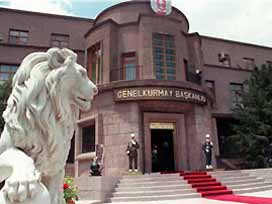Yaşlı: The Islamic-military alliance
Fatih Yaşlı in Birgün writes that the alliance between the supposed “vanguard of secularism” – the military – and political Islam, which historically was motivated by a shared desire to beat the left, has a long pedigree. The military entered into a pragmatic relationship with the political representatives of religion during the Cold War. One example was when the military after the coup in 1971 asked Necmettin Erbakan to return from his exile in Switzerland to found a new Islamist party. Yet for many years, the Islamists accused – not the military as an institution, but its top echelon – of being alien to the national culture and of being westernized. But this relation has now evolved. There is now a military that the Islamists can much easier embrace; the military is no longer viewed as being alien to “national values,” and is seen as the “army of the nation.” The fight against the PKK has deepened the relationship between Islamism and the military. We have now a “militarist Islam” that has appropriated the army and which is supporting the war. And the military has also changed, and is continuing to change, which presents us with an “Islamic militarism.” It is claimed that the lower echelons of the officers’ corps is becoming dominated by religious officers. It is also claimed that there is a similar process ongoing among the higher echelons, albeit less so. The one area that symbolizes the confluence of “militarist Islam” and “Islamic militarism” is the “national defense industry.” The character of the regime and its political economy was expressed in the fact that the president’s new son-in-law hails from one of the important families of this sector, and was underlined by the fact that the chief of the general staff acted wedding witness. That was a tremendous demonstration of the zeitgeist.
Babahan: The fight inside the military
Ergun Babahan in Özgür Düşünce writes that it is becoming increasingly clear that the Palace wants to have a big purge in the ranks of the military. It is equally clear that the general staff is resisting this. The pro-palace media provoked a reaction from the general staff by its recent stories claiming that “Gülenist officers in the armed forces are going to carry out a coup.” The General staff denied these allegations in a forceful language, stating that “no one can take action outside the chain of command.” This stance amounted to checking the demands for a purge. In fact, the fight is not really about the issue of the Gülenists, but about the relations to the United States and NATO. This is not an exclusive AKP operation, but a plan that is being implemented jointly with the neo-nationalists, the ulusalcı. The ulusalcı are attempting to regain the positions within the armed forces that they lost with the Ergenekon and Sledgehammer cases. The aim is to purge the cadres that have been on NATO duty in Brussels and Pentagon, and that are deemed to be close to the Western culture. Thus, it is not a question of purging Gülenists; what is taking place is a fight between the pro-NATO and ulusalcı cadres of the military. If the latter prevail, the command chain of the armed forces for years to come will be refashioned in accordance with the wishes of the ulusalcı. We are witnessing a fight that is going to determine Turkey’s place in the world.
Is Erdoğan Turkey’s Only Problem?
By Halil Karaveli
April 5, 2016
The outsize personality of President Erdoğan obscures the systemic dynamics that sustain his exercise of power. Erdoğan’s push for an executive presidency corresponds to the “logic” of Turkish state power. Erdoğan’s personal ambitions and raison d’état coincide to reinforce authoritarianism. Ultimately, democracy in Turkey is crippled because no major political force, representing the Turkish majority, challenges the dominant mentality that holds that the survival of the state requires the checking of ethnic and cultural diversity.
A Political Comeback for the Turkish Military?
By Lars Haugom
March 11, 2016
The Turkish military has no known intention to intervene in the political decision-making process. However, the military has retained a capacity to do so - both by means of its continued role in security policy making and its relative institutional autonomy. The extent of any military involvement in politics will largely depend on how the Kurdish issue is handled by the government. But it is still highly unlikely that any such involvement will take the form of a direct intervention.
Terror Likely to Strengthen Turkish Militarism
By Halil Karaveli
February 19, 2016
The wave of terror that has struck Turkey since last year is likely to have the cumulative effect of bolstering militarism as a response to the country’s Kurdish challenge. For the Turkish public in general, the February 17 bombing of the military convoy in Ankara, followed by a similar attack outside Diyarbakır the next day, are bound to serve as reminders that the armed forces are paying a heavy prize in what a majority of the population sees as a fight to preserve the unity of the fatherland. Ultimately, that will also have an impact on the power balance between the civilian and military wings of the Turkish regime.






